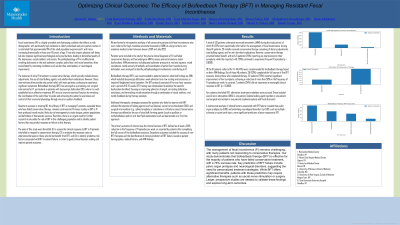Tuesday Poster Session
Category: Functional Bowel Disease
P4046 - Optimizing Clinical Outcomes: The Efficacy of Biofeedback Therapy (BFT) in Managing Resistant Fecal Incontinence
Tuesday, October 29, 2024
10:30 AM - 4:00 PM ET
Location: Exhibit Hall E


Ahmed E. Salem, MBBCh
Maimonides Medical Center
Brooklyn, NY
Presenting Author(s)
Ahmed E. Salem, MBBCh1, Syed Mujtaba Baqir, MD1, Sarah Meribout, MD1, Hazem Abosheaishaa, MD2, Morad Zaaya, MD1, Mohammed Abusuliman, MD3, Islam Mohamed, MD4, Carla Barberan Parraga, MD5, Syed Matthew. Kodilinye, MD1, Pranay Siriya, MD1, Khaled Elfert, MD6, Daniel A. DiLeo, MD7, Bani Chander Roland, MD7
1Maimonides Medical Center, Brooklyn, NY; 2Icahn School of Medicine at Mount Sinai, Queens, NY; 3Henry Ford Health, Detroit, MI; 4University of Missouri - Kansas City School of Medicine, Kansas City, MO; 5Maimonides Medical Center, New York, NY; 6West Virginia University, Morgantown, WV; 7VA New York Harbor Health System, Brooklyn, NY
Introduction: Fecal incontinence (FI) is widespread and socially devastating. Few effective treatments exist. Conservative therapy offers limited benefit. Prior studies show mixed success with biofeedback therapy (BFT) in FI. While BFT is established for dyssynergic defecation (DD), its efficacy in FI patients after failed conservative therapy is uncertain. Our aims were: 1) Assess BFT response in these patients; 2) Evaluate non-BFT therapy response rates; 3) Identify predictive risk factors for BFT treatment failure.
Methods: We reviewed consecutive FI patients referred for high-resolution anorectal manometry at a single tertiary care center from 1/2021-7/2022. BFT was recommended for DD, weak sphincter tone, low resting pressure, or impaired/heightened intrarectal sensation. Additional therapeutic strategies assessed included conservative management, injection of “bulking agent” (e.g. Solesta), sacral nerve stimulation (SNS), & surgery. Conservative therapy included stool bulk forming agents and/or anti-diarrheals. Clinical success after 5 sessions of BFT was defined as at least 50% reduction in FI episode frequency/week.
Results: A total of 513 completed ARM within the study period; 111 (22%) patients were referred for FI. Of this subgroup, 25 were initially treated with conservative measures, but only 6 (24%) reported benefit, while 19 (76%) reported no benefit (p < 0.0001). Overall, 46 (41%) patients were referred to BFT and of those, 29 (63%) completed the BFT therapy sessions. Of these, the majority reported benefit (n=22, 76% vs no benefit in 24%, p < 0.0001). Of the 7 patients who failed BFT, 4 were referred for additional treatments (SNS,n=1; Solesta, n=1; surgery, n=2). When looking at predictors of BFT failure, only pelvic organ prolapse and neurologic disease were significantly associated with lack of response.
Discussion: The management of FI remains challenging with limited therapeutic options. Our results show the majority of FI patients who fail to improve with conservative measures can improve with BFT. The only predictors of BFT treatment failure were pelvic organ prolapse and neurologic disease. Our findings suggest that BFT is of significant benefit in FI patients who have failed conservative therapies and may be considered a reasonable treatment strategy. Large-scale, prospective studies are needed to further delineate the efficacy of BFT and predictors of clinical response.
Disclosures:
Ahmed E. Salem, MBBCh1, Syed Mujtaba Baqir, MD1, Sarah Meribout, MD1, Hazem Abosheaishaa, MD2, Morad Zaaya, MD1, Mohammed Abusuliman, MD3, Islam Mohamed, MD4, Carla Barberan Parraga, MD5, Syed Matthew. Kodilinye, MD1, Pranay Siriya, MD1, Khaled Elfert, MD6, Daniel A. DiLeo, MD7, Bani Chander Roland, MD7. P4046 - Optimizing Clinical Outcomes: The Efficacy of Biofeedback Therapy (BFT) in Managing Resistant Fecal Incontinence, ACG 2024 Annual Scientific Meeting Abstracts. Philadelphia, PA: American College of Gastroenterology.
1Maimonides Medical Center, Brooklyn, NY; 2Icahn School of Medicine at Mount Sinai, Queens, NY; 3Henry Ford Health, Detroit, MI; 4University of Missouri - Kansas City School of Medicine, Kansas City, MO; 5Maimonides Medical Center, New York, NY; 6West Virginia University, Morgantown, WV; 7VA New York Harbor Health System, Brooklyn, NY
Introduction: Fecal incontinence (FI) is widespread and socially devastating. Few effective treatments exist. Conservative therapy offers limited benefit. Prior studies show mixed success with biofeedback therapy (BFT) in FI. While BFT is established for dyssynergic defecation (DD), its efficacy in FI patients after failed conservative therapy is uncertain. Our aims were: 1) Assess BFT response in these patients; 2) Evaluate non-BFT therapy response rates; 3) Identify predictive risk factors for BFT treatment failure.
Methods: We reviewed consecutive FI patients referred for high-resolution anorectal manometry at a single tertiary care center from 1/2021-7/2022. BFT was recommended for DD, weak sphincter tone, low resting pressure, or impaired/heightened intrarectal sensation. Additional therapeutic strategies assessed included conservative management, injection of “bulking agent” (e.g. Solesta), sacral nerve stimulation (SNS), & surgery. Conservative therapy included stool bulk forming agents and/or anti-diarrheals. Clinical success after 5 sessions of BFT was defined as at least 50% reduction in FI episode frequency/week.
Results: A total of 513 completed ARM within the study period; 111 (22%) patients were referred for FI. Of this subgroup, 25 were initially treated with conservative measures, but only 6 (24%) reported benefit, while 19 (76%) reported no benefit (p < 0.0001). Overall, 46 (41%) patients were referred to BFT and of those, 29 (63%) completed the BFT therapy sessions. Of these, the majority reported benefit (n=22, 76% vs no benefit in 24%, p < 0.0001). Of the 7 patients who failed BFT, 4 were referred for additional treatments (SNS,n=1; Solesta, n=1; surgery, n=2). When looking at predictors of BFT failure, only pelvic organ prolapse and neurologic disease were significantly associated with lack of response.
Discussion: The management of FI remains challenging with limited therapeutic options. Our results show the majority of FI patients who fail to improve with conservative measures can improve with BFT. The only predictors of BFT treatment failure were pelvic organ prolapse and neurologic disease. Our findings suggest that BFT is of significant benefit in FI patients who have failed conservative therapies and may be considered a reasonable treatment strategy. Large-scale, prospective studies are needed to further delineate the efficacy of BFT and predictors of clinical response.
Disclosures:
Ahmed Salem indicated no relevant financial relationships.
Syed Mujtaba Baqir indicated no relevant financial relationships.
Sarah Meribout indicated no relevant financial relationships.
Hazem Abosheaishaa indicated no relevant financial relationships.
Morad Zaaya indicated no relevant financial relationships.
Mohammed Abusuliman indicated no relevant financial relationships.
Islam Mohamed indicated no relevant financial relationships.
Carla Barberan Parraga indicated no relevant financial relationships.
Syed Kodilinye indicated no relevant financial relationships.
Pranay Siriya indicated no relevant financial relationships.
Khaled Elfert indicated no relevant financial relationships.
Daniel DiLeo indicated no relevant financial relationships.
Bani Chander Roland indicated no relevant financial relationships.
Ahmed E. Salem, MBBCh1, Syed Mujtaba Baqir, MD1, Sarah Meribout, MD1, Hazem Abosheaishaa, MD2, Morad Zaaya, MD1, Mohammed Abusuliman, MD3, Islam Mohamed, MD4, Carla Barberan Parraga, MD5, Syed Matthew. Kodilinye, MD1, Pranay Siriya, MD1, Khaled Elfert, MD6, Daniel A. DiLeo, MD7, Bani Chander Roland, MD7. P4046 - Optimizing Clinical Outcomes: The Efficacy of Biofeedback Therapy (BFT) in Managing Resistant Fecal Incontinence, ACG 2024 Annual Scientific Meeting Abstracts. Philadelphia, PA: American College of Gastroenterology.
